Cable-Stayed Bridge
- Suspension Bridge
- Cable-Stayed Bridge
- Arch Bridge
- Truss Bridge
- Box Girder Bridge
- Girder Bridge
- Rigid Frame Bridge
- Pedestrian Bridge
Kesennuma Bay Crossing Bridge
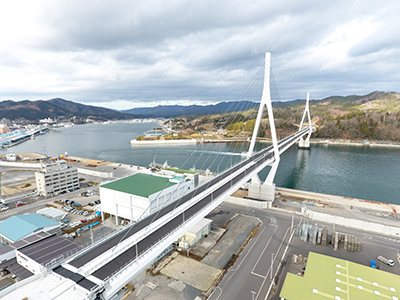
| Client | Tohoku Regional Development Bureau |
|---|---|
| Bridge type | 3-Span Continuous Cable-Stayed Bridge |
| Erection method | Crawler Crane Erection + Balanced Cantilever Erection |
| Completed in | 2021 |
| Location | Miyagi Prefecture, Japan |
2022 Japan Society of Civil Engineers Tanaka Award
Nhat Tan Bridge
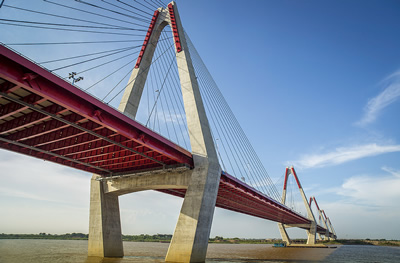
| Client | PMU85, Ministry of Transport, Vietnam |
|---|---|
| Bridge type | 6-span continuous Cable-Stayed Bridge |
| Erection method | Crawler Crane Erection + Balanced Cantilever Erection |
| Completed in | 2014 |
| Location | Hanoi, Socialist Republic of Viet Nam |
2014 Japan Society of Civil Engineers Tanaka Award winning.
6 span continuous cable-stay bridge
Yuri Bridge
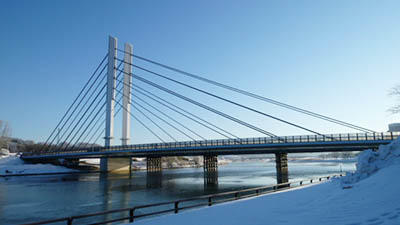
| Client | Yurihonjo City |
|---|---|
| Bridge type | Cable-Stayed Bridge |
| Erection method | Crawler Crane Bent Erection |
| Completed in | 2012 |
| Location | Akita Prefecture, Japan |
Binh Bridge
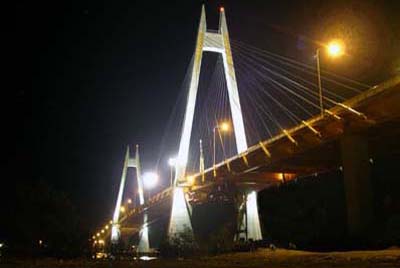
| Client | Binh Bridge PMU, Haiphong People’s Committee, Vietnam |
|---|---|
| Bridge type | 3-span continuous Cable-Stayed Bridge |
| Erection method | Cantilever Erection |
| Completed in | 2005 |
| Location | Haiphong, Socialist Republic of Viet Nam |
The bridge consists of 17-span continuous steel and pre-cast RC slab composite girders, with three center spans of the cable-stayed type. A steel and pre-cast RC slab composite girder was selected to minimize its own weight and shorten the construction period.
Tatara Bridge
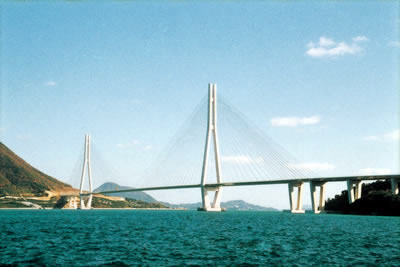
| Client | Honshu-Shikoku Bridge Authority |
|---|---|
| Bridge type | Cable-Stayed Bridge |
| Erection method | Assembled Large Block Erection Method by Floating Crane + Cantilever Erection |
| Completed in | 1998 |
| Location | Hiroshima-Ehime (Nishi-Seto Expressway), Japan |
1998 Japan Society of Civil Engineers Tanaka Award winning.
The TATARA Bridge is the 2nd longest cable-stayed bridge in the world. A 3D wind tunnel test was carried out at the IHI research center during the design stage to verify its wind-resistance stability.
Meiko East Bridge
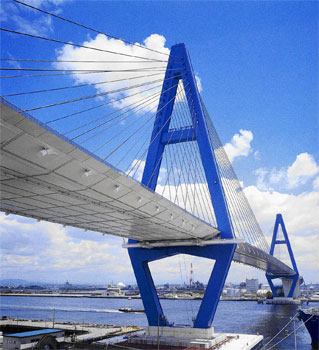
| Client | Japan Highway Public Corporation |
|---|---|
| Bridge type | 3-span continuous Cable-Stayed Bridge |
| Erection method | Block Erection Method by Floating Crane + Vertical Hanging Method |
| Completed in | 1997 |
| Location | Aichi Prefecture, Japan (Isewangan Expressway) |
1997 Japan Society of Civil Engineers Tanaka Award winning.
The Meiko East Bridge was erected using the balancing method, whereby no temporary bents were required to support the decks. This method enables the navigation channel to remain open during the construction. The structural stability and displacement were also continually monitored during the construction period.
Tsurumi-Tubasa Bridge
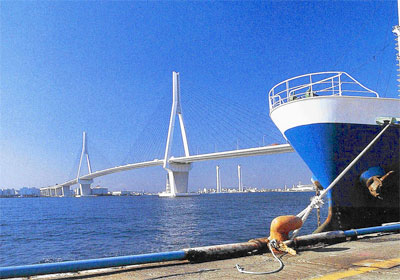
| Client | Metropolitan Expressway Public Corporation |
|---|---|
| Bridge type | 3-span continuous Cable-Stayed Bridge |
| Erection method | Assembled Large Block Erection Method by Floating Crane |
| Completed in | 1994 |
| Location | Kanagawa Prefecture, Japan (Bay Shore Route) |
1994 Japan Society of Civil Engineers Tanaka Award winning.
Ikuchi Bridge
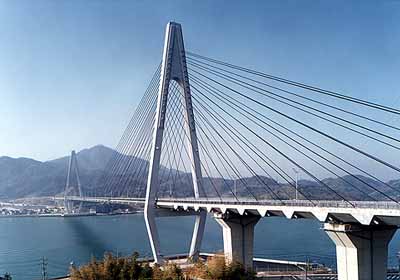
| Client | Honshu-Shikoku Bridge Authority |
|---|---|
| Bridge type | 3-span continuous Cable-Stayed Bridge |
| Erection method | Vertical Hanging Method |
| Completed in | 1991 |
| Location | Hiroshima Prefecture, Japan - Ehime Prefecture, Japan (Nishi-Seto Expressway) |
Yokohama-bay Bridge
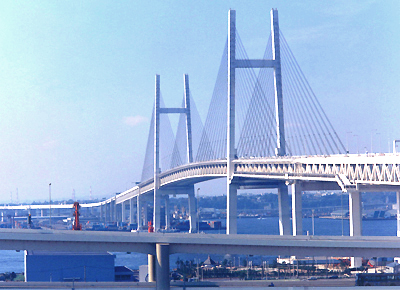
| Client | Metropolitan Expressway Public Corporation |
|---|---|
| Bridge type | 3-span continuous Truss beam Cable-Stayed Bridge |
| Erection method | Assembled Large Block Erection Method by Floating Crane + Cantilever Erection |
| Completed in | 1989 |
| Location | Yokohama, Japan (Bay Shore Route) |
1989 Japan Society of Civil Engineers Tanaka Award winning.
The main structure is a double deck truss bridge. The upper deck box-girder, vertical members and lower deck cross beams form a rigid frame.
Torikai-Niwaji Bridge
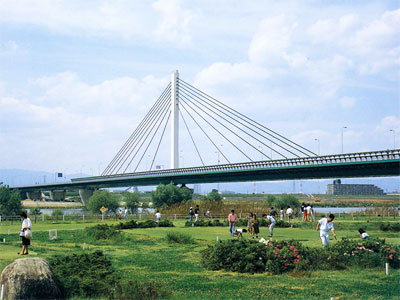
| Client | Osaka prefectural road public corporation |
|---|---|
| Bridge type | Cable-Stayed Bridge |
| Erection method | Cantilever Erection |
| Completed in | 1987 |
| Location | Osaka Prefecture, Japan |
Iwakurojima Bridge
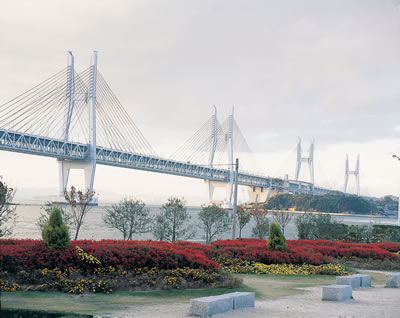
| Client | Honshu-Shikoku Bridge Authority |
|---|---|
| Bridge type | 3-span continuous Truss beam Cable-Stayed Bridge |
| Erection method | Cantilever Erection |
| Completed in | 1986 |
| Location | Kagawa Prefecture (Seto Chuo Expressway) |
A combined railway-roadway type bridge.






